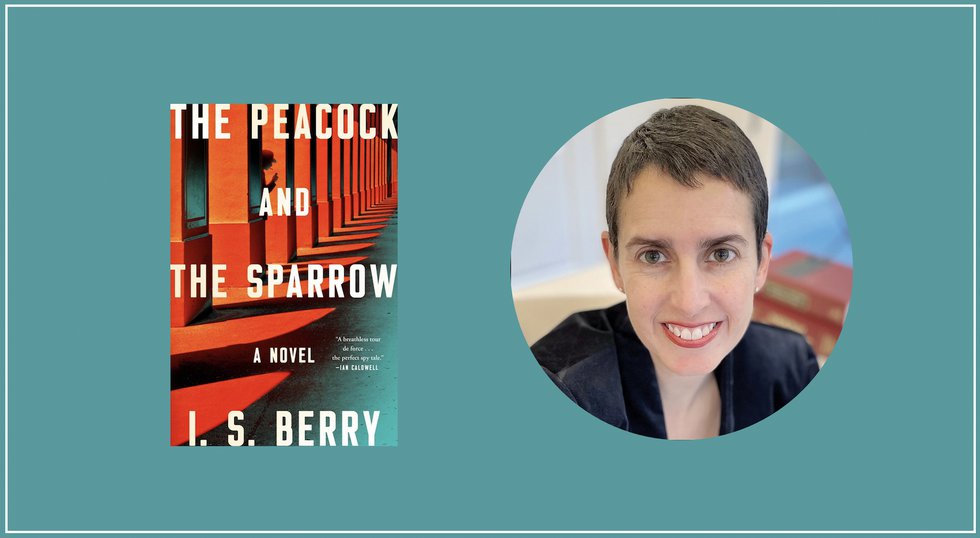Six questions for this debut thriller writer.

The Peacock and the Sparrow by I.S. Berry. Atria Books. pp. 320. $28.
Konstantin Rega: What inspired this story following a spy stationed in the Middle East?
I.S. Berry: I was a spy for the CIA for six years, and spent a year in wartime Baghdad trying to dismantle Abu Musab al-Zarqawi’s network. Espionage, I found, was a murky world in which there was no clear right side, and the truth was elusive. Make the right move and you save a life; make the wrong move and you ruin one. Long after coming in from the cold, I found that my decisions and operations still haunted me.
After leaving the CIA, I lived in Bahrain during the Arab Spring. The conflict was complex and multifaceted; there was no clear right side. It was, I realized, the perfect prism for a spy story. The Peacock and the Sparrow was born. It’s about a spy on his final tour who gets caught in the crosswinds of the Arab Spring. After becoming ensnared in murder, consuming love, and an unpredictable revolution, he’s forced to make decisions that have world-altering consequences. In so many ways, the story captures my own experiences.
What do you want readers to get from it?
I set out to write the most authentic spy novel I could. The literary world has plenty of car-chasing, roof-scaling, martini-drinking spies; what it lacks are gritty, real spies. I hope my book provides a window into the more realistic side of espionage, especially the toll it takes on you. I sought to portray the compromises you’re forced to make, the weight and hazards of decisions, the guilt and debilitation from constantly manipulating informants, the haunting irresolution that stays with you long after you’ve left the world of intelligence.
I also hope readers will relate to my story at a human level. Yes, my protagonist is a spy, but he’s also just a middle-aged guy trying to make something of his life, make a dent in the world, change course—and not always succeeding. I think that’s something anyone can relate to; I certainly could.
Why did you decide to write this book, what drew you to becoming a writer?
I’d always been drawn to writing as a way to process and find meaning in my experiences, and to express myself. When I backpacked around Europe in my twenties, I kept voluminous journals documenting my experiences—sights, passengers on trains, my reflections. After graduating from college, I moved to post-communist Prague—a sort of 1990s Left Bank—worked as a newspaper editor, and attempted, unsuccessfully, to write a novel. It wasn’t until I’d worked as a spy that I finally had the right material for a book. And I got to the point in my life where writing about espionage was almost imperative—my experiences just wouldn’t let me go.
What was most memorable working for the CIA (of which you’re allowed to speak of that is)?
I have plenty of memorable moments from my time at the Agency—ducking into a bunker on New Year’s Eve during an intense rocket attack on the Green Zone; debriefing an informant in my car while tracer fire filled the sky. But one of my favorite moments is actually quite mundane. It was the simple act of handing over a briefcase—I was a courier—outside an embassy’s gates on a snowy morning. I didn’t know the recipient’s name and he didn’t know mine. There was something so elegant and elemental about it, like a scene from a le Carré novel.
One surprising (and wonderful) memory was witnessing the first democratic elections in Iraq. In 2005, the country was consumed by violence; everyone predicted the elections would be a disaster. Instead, the day was incredibly peaceful, and the turnout was staggering. Nothing could stop people who’d been repressed for decades from voting. It was the most resounding blow to terrorism I witnessed while there.
What was it like living overseas in a precarious place? What struck you about the cultural differences?
Bahrain was a fascinating place to live. A small wealthy Sunni elite rules a relatively impoverished Shiite majority. The regime is dictatorial; there’s limited freedom of speech and the press; police are heavy-handed; journalists and activists are often prohibited from entering the country. Two years in Bahrain made me appreciate the freedoms we have in the West.
It was also illuminating to live in Bahrain during the Arab Spring, which began there in 2011. I witnessed clashes—riots and tear gas filling the streets—on a regular basis. Bahrain’s a tiny island in the Gulf, but it’s a pivotal battleground for Iran and Saudi Arabia. It’s essentially the vortex of a Middle Eastern Cold War. Living there, I realized that the Arab Spring, like most global conflicts, was much more complex and nuanced than headlines suggested.
This was such a thrilling read, are you thinking of writing anything else?
Absolutely. I’ve started writing another spy novel based on my experiences as a counterterrorist spy in Baghdad. I plan to focus on one operation in particular: tracking down and helping to apprehend an alleged terrorist, only to learn later he might not be guilty—and the Koestler-like consequences that followed. I can’t seem to let espionage go—or maybe it’s the other way around.
Get a copy at The Bookshop.









